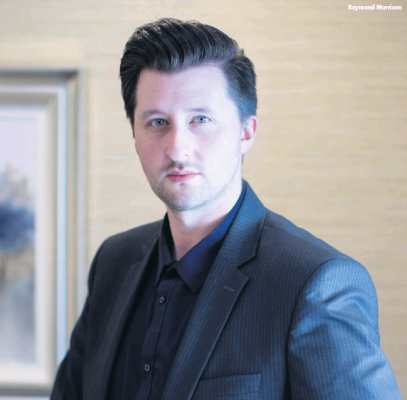The post holder: Raymond Morrison
The post: Interior Designer, Wardens of Newtownards
From a school work experience placement, Raymond Morrison has trained and worked his way up into a career as an interior designer
Give a brief outline of your career to date.
I began my career in Wardens of Newtownards when I shadowed the then Head of Design, Lisa Lovell, on work experience. It was during this time and thanks to Lisa that my love of design, and indeed the company, was solidified. I often say that I wouldn’t be in the position that I am today if it hadn’t been for Lisa’s guidance, instruction and wealth of knowledge that she offered to me.
I worked in Wardens part-time, through school and university and was very fortunate when a position arose that allowed me to move into a full-time design position.
What was your favourite subject at school?
Without a doubt it was Art; I lived, breathed and slept it!
Did you go on to further/ higher education, if so what did you study and where?
After GCSEs and A-levels I went to Queen’s University Belfast to study Architecture.
How did you get into your area of work?
I have always wanted to work in the creative industry, whether it be in the design of buildings or their internal spaces. For me interior design and architecture are inextricably linked. I knew quite early on in my studies that Architecture was not the route I would like to pursue and after three years I was able to side step into interior design. A move that I have never regretted.
Were there any particular essential qualifications or experience needed?
A degree is certainly very useful, but the skills that you learn while working on a project and acquire over time are invaluable.
Are there alternative routes into the job?
Getting a degree is an obvious progression towards becoming a professional designer, although from personal experience being mentored and shaped both creatively and in the practical application of how good design works is a fantastic alternative. There are times that you learn most from seeing how things are made and understanding what is possible and what isn’t.
What does a typical day entail?
The best thing about my job is that there are no typical days, it’s one of the many things that I love most about what I do. Whether it be meeting with a contractor on site or chatting with clients over beautiful fabrics and wall coverings, my job could never be boring. A client can leave an empty house in the morning and come back to a beautifully furnished home ready to be lived in and enjoyed. Keeping up with the latest design style or trend is a crucial part of my job and I love sourcing new products, London and Paris are a particular favourite.
What are the best and most challenging aspects of the job?
For me the most challenging aspect of my job would be trying to fit everything in! There really aren’t enough hours in the day. As far as the best aspect of my job is concerned I would say that I am very fortunate to have a very dedicated and skilled team working alongside me. From excellent decorators, carpet and curtain fitters, to highly skilled in-house soft furnishing manufacturers. These people make the magic happen and turn my visions into reality
Why is what you do important?
Creating a home for someone gives me an amazing feeling of accomplishment and satisfaction. Being able to enrich someone’s life and witness their joy when I reveal the completed project is very special for me.
If you weren’t doing this what would you like to do?
I am a big foodie and if I were to do anything else it would probably be down the culinary route.
Describe your ideal day off.
Having four children, and one on the way, I come to work for respite! So, on a day at home I like to relax and just enjoy being with my lovely wife and family. It’s great fun. There is nothing better than packing a picnic and taking a trip to the park. The simple things in life are always the best.
And finally, what’s the key to any successful job search?
To be sure of your end goal, where you want to be and never give up.


